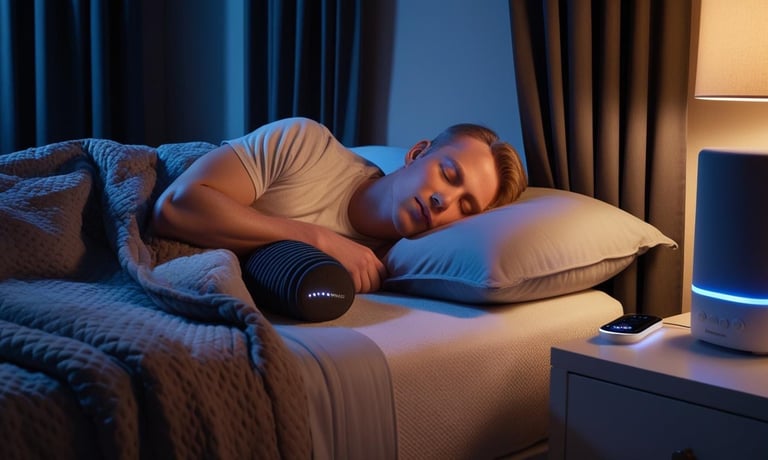Neuroscience of Sleep: Improve Sleep Quality
HEALTH & WELLNESS
By Sia Imime
4/16/20253 min read


Disclosure: This article contains affiliate links, meaning that if you purchase through them, I may earn a small commission at no extra cost to you. I only recommend products that I believe will add value to your personal growth journey.
Sleep is not just a luxury—it’s a biological necessity. Yet, millions of people suffer from poor sleep quality, unaware of how it affects every aspect of their well-being. From memory consolidation to immune health, sleep plays a critical role in our physical and mental performance. In this article, we dive deep into the science of sleep and offer powerful tips—grounded in research—to help you sleep better starting tonight.
The Sleep Cycle: What Happens When You Rest
Sleep isn’t one continuous state. It occurs in cycles consisting of four stages:
Stage 1 (Light Sleep): Transition between wakefulness and sleep.
Stage 2 (Deeper Light Sleep): Heart rate and body temperature drop.
Stage 3 (Deep Sleep): Also known as slow-wave sleep. Critical for body restoration.
REM (Rapid Eye Movement): Dream state. Vital for emotional regulation and memory.
A full sleep cycle lasts about 90 minutes, and healthy adults experience 4–6 cycles per night.
Fun Fact: Brain wave activity in deep sleep mimics that of meditative states—making it essential for mental recovery.
Why Sleep Matters: Scientific Evidence
Memory & Learning: According to a study from Harvard Medical School, sleep is essential for memory consolidation and problem-solving.
Mood Stability: Lack of REM sleep can increase emotional reactivity and risk of depression.
Weight Regulation: Research in the journal Sleep found that people who sleep less than 6 hours a night are 30% more likely to become obese.
Immune Health: During sleep, the body releases cytokines that fight inflammation and infection.
Cell Repair: Human growth hormone (HGH) peaks during deep sleep, facilitating cellular regeneration.
Common Sleep Disruptors (and Fixes)
Blue Light Exposure: Blue light from screens suppresses melatonin production.
Fix: Use blue-light-blocking glasses or apps like f.lux or Night Shift.
Caffeine Late in the Day: Caffeine has a half-life of up to 6 hours.
Fix: Cut off caffeine by 2 PM.
Inconsistent Sleep Schedule: Irregular sleep times confuse your circadian rhythm.
Fix: Go to bed and wake up at the same time every day—even on weekends.
Stress & Anxiety: Elevated cortisol disrupts sleep cycles.
Fix: Try mindfulness, journaling, or breathing exercises before bed.
How to Improve Your Sleep Quality: Backed by Research
1. Optimize Your Bedroom Environment
Keep the room cool (60–67°F or 16–19°C).
Use blackout curtains to eliminate light pollution.
Block noise with a white noise machine or earplugs.
Recommended: Blackout Curtains / White Noise Machine
2. Upgrade Your Sleep Tools
Invest in a quality mattress and pillow suited to your sleep position.
Use a weighted blanket for anxiety relief.
Recommended: Memory Foam Pillow / Weighted Blanket
3. Create a Sleep-Inducing Night Routine
Dim the lights 1 hour before bed.
Avoid screens or use blue light filters.
Engage in calming activities like reading or herbal tea.
Recommended: Chamomile Sleep Tea / Bedside Reading Lamp
Advanced Hacks: Biohacking Your Sleep
Supplement with Magnesium Glycinate or L-Theanine: Both promote relaxation without causing grogginess.
Try Binaural Beats or 432Hz Music: Shown to enhance deep sleep and reduce anxiety.
Use a Sleep Tracker: Devices like Oura Ring or smartwatches give real-time feedback on sleep cycles and disruptions.
Recommended: Magnesium Glycinate Supplement / Sleep Headphones for Binaural Beats
Warning Signs of Sleep Disorders
If you're doing everything right and still waking up tired, consider consulting a professional. Possible conditions include:
Sleep Apnea
Insomnia
Restless Leg Syndrome
Delayed Sleep Phase Disorder (DSPD)
Final Thoughts: Treat Sleep as Sacred
Sleep is not optional self-care—it’s essential to thriving. Improving your sleep isn't just about quantity; it’s about quality. By understanding how sleep works and applying science-backed strategies, you can boost your mood, brain function, and overall vitality.
Tonight, take sleep seriously. Your body and mind will thank you.
Tags: sleep science, better sleep tips, sleep cycle, deep sleep, REM sleep, sleep hygiene, insomnia remedies, improve sleep quality, circadian rhythm, natural sleep aids, sleep biohacking, bedroom environment, stress and sleep, healthy sleep habits, sleep and health
